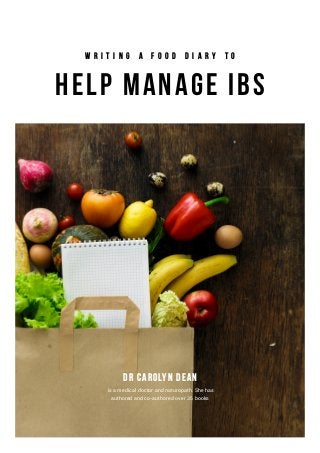Writing a Food Diary to Help Manage IBS
•
0 likes•2,638 views
Writing a food diary is recommended by many experts as the first step towards managing the symptoms of irritable bowel syndrome.
Report
Share
Report
Share
Download to read offline

Recommended
Recommended
More Related Content
More from Dr Carolyn Dean
More from Dr Carolyn Dean (20)
What Are the Risks of the Atrial Fibrillation Ablation Procedure?

What Are the Risks of the Atrial Fibrillation Ablation Procedure?
What Is the Relationship Between Calcium and Vitamin D?

What Is the Relationship Between Calcium and Vitamin D?
What Are the Positive Effects of Magnesium on Health?

What Are the Positive Effects of Magnesium on Health?
Recently uploaded
Recently uploaded (20)
Book Trailer: PGMEE in a Nutshell (CEE MD/MS PG Entrance Examination)

Book Trailer: PGMEE in a Nutshell (CEE MD/MS PG Entrance Examination)
Hemodialysis: Chapter 2, Extracorporeal Blood Circuit - Dr.Gawad

Hemodialysis: Chapter 2, Extracorporeal Blood Circuit - Dr.Gawad
MALE REPRODUCTIVE TOXICITY STUDIES(Toxicokinetics).pptx

MALE REPRODUCTIVE TOXICITY STUDIES(Toxicokinetics).pptx
Cas 28578-16-7 PMK ethyl glycidate ( new PMK powder) best suppler

Cas 28578-16-7 PMK ethyl glycidate ( new PMK powder) best suppler
Cervical screening – taking care of your health flipchart (Vietnamese)

Cervical screening – taking care of your health flipchart (Vietnamese)
Relationship between vascular system disfunction, neurofluid flow and Alzheim...

Relationship between vascular system disfunction, neurofluid flow and Alzheim...
Vaccines: A Powerful and Cost-Effective Tool Protecting Americans Against Dis...

Vaccines: A Powerful and Cost-Effective Tool Protecting Americans Against Dis...
BMK Glycidic Acid (sodium salt) CAS 5449-12-7 Pharmaceutical intermediates

BMK Glycidic Acid (sodium salt) CAS 5449-12-7 Pharmaceutical intermediates
CURRENT HEALTH PROBLEMS AND ITS SOLUTION BY AYURVEDA.pptx

CURRENT HEALTH PROBLEMS AND ITS SOLUTION BY AYURVEDA.pptx
Cardiac Impulse: Rhythmical Excitation and Conduction in the Heart

Cardiac Impulse: Rhythmical Excitation and Conduction in the Heart
Aptopadesha Pramana / Pariksha: The Verbal Testimony

Aptopadesha Pramana / Pariksha: The Verbal Testimony
Young at heart: Cardiovascular health stations to empower healthy lifestyle b...

Young at heart: Cardiovascular health stations to empower healthy lifestyle b...
Writing a Food Diary to Help Manage IBS
- 1. Help Manage IBS Dr Carolyn Dean W r i t i n g a F o o d D i a r y t o is a medical doctor and naturopath. She has authored and co-authored over 35 books
- 2. 2 Writing a Food Diary to Help Manage IBS Writing a food diary is recommended by many experts as the first step towards managing the symptoms of irritable bowel syndrome. A food diary helps to identify trigger foods and notice patterns and connections to food and drink that cause a flare-up of symptoms.
- 3. 3 A food diary for IBS should detail everything that is eaten or drunk throughout the course of each day, in- cluding ingredients and how the food was prepared. Different ways of cook- ing, such as frying or baking, can cause different reactions. Drinks can be just as guilty as food when it comes to IBS symptoms, so these should be recorded as well. For example, alcohol and caffeine are known irritants. The size of portions eaten can make a difference as to whether the food caus- es an adverse effect in the bowel or not, so portion sizes should be recorded. Any snacks, no matter how small or seemingly insignificant, should also be detailed. This includes things people may not usually think of as food, such as chewing gum. Meals and Ingredients Drinks Portions and Snacks ‘IBS for Dummies’ has professional advice for people dealing with irritable bowel syndrome.
- 4. You can learn more about this book and about IBS by visiting the blog of Dr. Carolyn Dean. Dr Carolyn Dean
